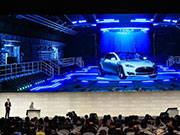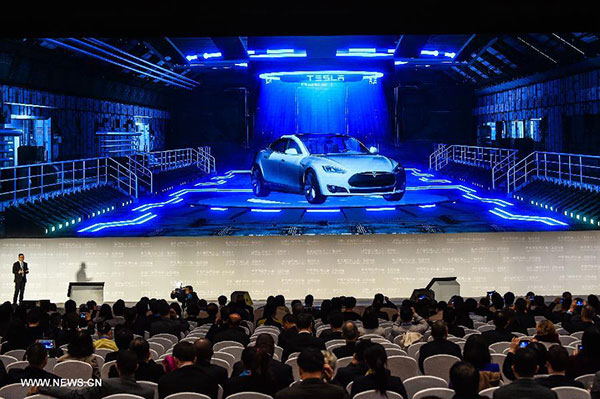Scientific & technological achievements shine at WIC

 0 Comment(s)
0 Comment(s) Print
Print E-mail CNTV, November 17, 2016
E-mail CNTV, November 17, 2016
The third World Internet Conference is under way in Wuzhen. Besides discussions about the future of the digital economy, some of the highlights we will be watching for include more clues about China's leadership's new Internet policy.
 |
|
A representative of Tesla introduces an automated assistance driving system during a release ceremony of world leading internet scientific and technological achievements at the 3rd World Internet Conference in Wuzhen, east China's Zhejiang Province, Nov. 16, 2016. [Xinhua] |
China acknowledged last month that the country needs breakthroughs in, among other things, high-performance computing and operating systems. More guidelines on innovation are also expected at the conference. All eyes also are on Baidu's first driverless cars. The vehicles reportedly are able to analyze traffic flows and control their maneuvering automatically.
15 world leading Internet scientific and technological achievements selected from a pool of about 500 entries were announced Wednesday during the third annual World Internet Conference in Wuzhen.
Microsoft's HoloLens, a pair of glasses that lets one view VR holograms in the physical world, was among the avant-garde selections. The state-of-the-art achievements were chosen from a pool of 500 entries vetted by a panel of 30 experts.
Telsa unveiled its Autopilot 2.0.
"We have eight cameras around the car, with 12 ultra-sound detectors and radar on the front. So this car has 360-degree sight, and sees 250 meters above. The computer inside the car runs at 40 times the speed of our first-generation model," Tesla's head for Asia Pacific Ren Yuxiang said.
Tesla's autopilot system enables a cart to steer itself and independently manage a parking place. IBM Watson 2016 is an expert AI system based on cognitive technology.
Qualcomm introduced its 5G platform for smart transportation.
"When we design a new smart transport system, we need to run it in a real world setting. This 5-G system is the platform for the test drives," Vice president of Qualcomm Technologies Li Weixing said.
Germany's SAP is showcasing a new industrial 4.0 solution.
"The product can fulfil the need for tailored merchandise for consumers on a large scale. It can also manufacture those products automatically. It is able to produce personalized products in smart mass production," SAP global vice president Li Qiang said.





